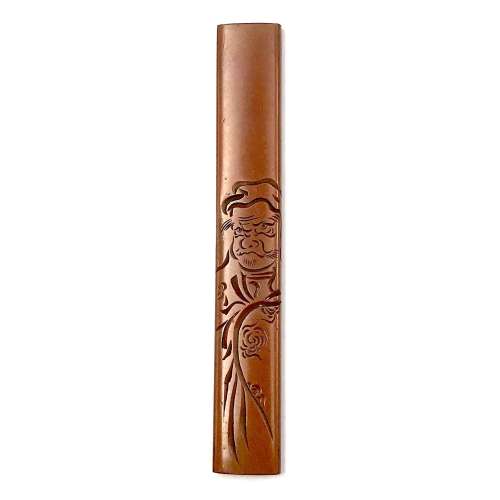Kozuka made of pure copper with Daruma motif. The engraving technique is known as katakibori ("half-cut carving"). Signed on the back: Yasuchika.
Size: 96.5 (H) x 14.5 mm (W).
Edo period (Late 18th century).
The technique of Katakiribori was developed by Yokoya school of artisans. Detailed account of Yasuchika family of kodōgo carvers is given at Japanese Sword Fittings from the Alexander G. Mosle Collection; Sebastian Izzard LLC, 2004 on page 64. The article ends with the following statement: "Given the popularity of his style and his many students, it is not surprising that a number of works bearing Yasuchika's signature are today disputed." S. Izzard attributes Yasuchika masters to Nara school.
Yasuchika-signed kozuka in
Important Japanese Swords and Sword Furniture and Works of Art [November 5, 1980, sales "Kotetsu". New York, Christie, Manson & Woods International Inc., 1980, pp.92-93, lot 172 and 173] are stylistically very different to our example.
A shibuichi katakiribori kozuka, bearing the signature of Yashuchika, is illustrated at The Hartman Collection of Japanese Metalwork [sold at auction by Christie, Manson & Woods Ltd. June 30 and July 1, London, 1976] on page 82, lot 291. It depicts Daikoku and stylistically similar to ours. The description on page 83 says: "signed Yasuchika, and inscribed "drawn by Hanabusa Itcho" (Yasuchika IV, school of Iawamoto konkan, circa 1800)".
A detailed account of Yasuchika signatures is presented at
Masterpiece tsuba and kodogu from the Hans Conried and Alexander G. Mosle collections. Important woodblock prints by Utamaro, Hokusai, Hiroshige, Yoshida and other masters. San Francisco, September 1-25, 1983. Catalog #7. Robert E. Haynes, Ltd., pp. 141-174. The example that looks like ours is on page 146:


Though we have to admit that the example from Catalog #7 by Robert E. Haynes looks much stronger.

 Though we have to admit that the example from Catalog #7 by Robert E. Haynes looks much stronger.
Though we have to admit that the example from Catalog #7 by Robert E. Haynes looks much stronger.


 Though we have to admit that the example from Catalog #7 by Robert E. Haynes looks much stronger.
Though we have to admit that the example from Catalog #7 by Robert E. Haynes looks much stronger.